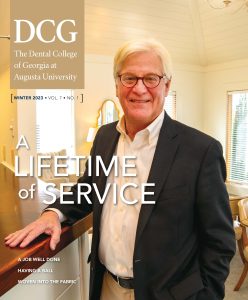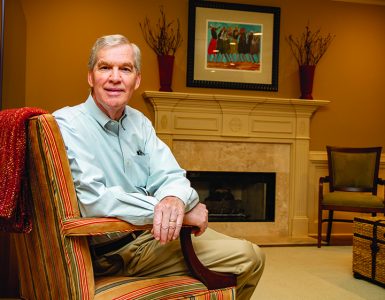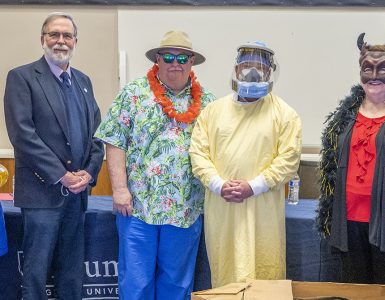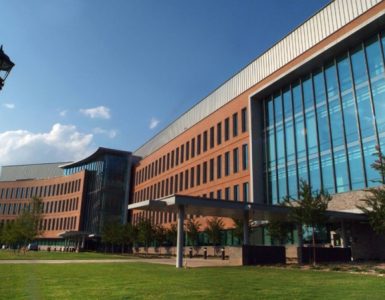 Being named The Dental College of Georgia’s 2023 Distinguished Alumnus is a mixed bag for Dr. J. Ben Deal.
Being named The Dental College of Georgia’s 2023 Distinguished Alumnus is a mixed bag for Dr. J. Ben Deal.
“I’m very grateful for the honor, but I’m uncomfortable with the attention,” he concedes.
Yet Deal is a master at thriving outside his comfort zone. Thoroughly amiable and whip-smart articulate, he seizes the opportunity to use the platform not for self-aggrandizement, which he finds cringe-worthy, but for publicizing news of the causes closest to his heart: health care and philanthropy. Deal (’74) practiced general dentistry in Augusta for 40 years before semi-retiring in 2018. He left the practice, Augusta Family Dentistry, in the very capable hands of his partner, Dr. Walter Green (’14), assuming he would spend his newfound downtime with his family and golf buddies.
But destiny had other plans. Deal’s grandfather, father and son are graduates of the Medical College of Georgia, and he was a willing spirit when in 2008 he joined the board of directors of the MCG Foundation, a nonprofit corporation formed to advance the mission of the third-oldest medical school in the Southeast. He anticipated serving as a pair of helping hands for the foundation’s other members, most of whom are physicians.
“Everybody around me was so knowledgeable,” Deal says. “I just showed up, listened and tried to learn as much as I could.” But his fellow board members quickly spotted Deal’s leadership acumen, appointing him to committees for causes including stewardship and scholarships. In 2018, he was elected the foundation’s first non-physician chairman. During his four-year tenure, Deal oversaw the foundation’s acquisition of riverfront property to launch the Georgia Cyber Innovation and Training Center, two student residence facilities on the Health Sciences Campus and extensive interdisciplinary initiatives that link biomedical research to the liberal arts on the Summerville Campus. Still active on the board, he is thrilled to have helped make pivotal decisions regarding the largest private gifts MCG has ever received: $76 million from the late Dr. J. Harold Harrison (MCG, ’48) and his wife, Sue, to fund MCG scholarships, faculty-endowed chairs and facilities; and $10 million in cash, real estate and other assets from George Weiss, a now-deceased Augusta businessman.
“Thank goodness I had the chance to get to know Dr. Harrison,” says Deal, noting that Augusta University’s J. Harold Harrison, M.D. Education Commons, a learning facility for health students adjacent to the dental school, is named in his honor. “He was what true philanthropy is all about. The increase in our endowment has allowed us to compete with much better-known schools. We can offer full scholarships now for very talented students who could choose any school in the country. People are getting much more discerning about where their education dollars go, and more and more of the best minds in the nation are choosing AU, often due to the scholarship assistance we can offer.”
Likewise, Deal notes that the 11 acres of land donated by Weiss have unleashed extraordinary potential for MCG and the community it serves. “Mr. Weiss wanted to be involved in research, and thanks to his generous gift, MCG has been on the cutting edge of electronic medicine,” Deal says. Weiss’s real estate gifts have yielded vast returns as well. Says Deal, “I feel a great sense of responsibility toward making sure we do the right thing with the property he donated. Since his gift, we’ve added 30 to 40 acres of property which we hope to develop for the betterment of the city and the university. We don’t want to wall ourselves away from the community. We feel community outreach is keenly important.”
For instance, in partnership with the Augusta National Golf Club, the Boys and Girls Clubs of Greater Augusta and the CSRA Community Foundation, the MCG Foundation recently unveiled the HUB Innovation Center, a downtown Augusta complex that houses four nonprofit organizations in addition to the Boys and Girls Clubs. “Our wonderful partners want to do transformative things for Augusta, and we want to be the vehicle that makes it happen,”
Deal explains. “Thanks to the HUB, the tenants (Harrisburg Family Healthcare Clinic, RISE Augusta, Augusta Locally Grown and the Augusta University Literacy Center) don’t have to pay a dime of rent or overhead. It’s a remarkable scene and an incredible addition to the community. We hope to fund some dental interests on the property as well.”
Deal is also a member of the Association of Governing Boards of Universities and Colleges, counseling members of the national organization by “offering direction about independent foundations’ goals and missions,” Deal says.
“We need to make sure we’re always doing right by the school we represent,” he says. “That’s why foundations exist.”
He notes that his work with the foundation is a natural continuation of a lifetime of service.
“I remember going on house calls with my dad when I was a kid,” says Deal, who grew up in Statesboro, Georgia. “It was kind of an adventure, heading out at 9 p.m. to some house in the country.”
He was humbled by the spirit of service exemplified by both he chose dentistry in hopes of spending more time with his family, a goal he is proud to say he accomplished.
He enrolled in DCG (then the Medical College of Georgia School of Dentistry) in 1971, an era in which a shortage of dentists spurred legislators to approve a three- rather than four-year course of study. The coursework itself wasn’t truncated, of course, so Deal and his classmates experienced the often-grueling whirlwind of nonstop study.
 “It was very demanding. But my classmates and I became very close; we were kind of in the war together, so to speak. And we had such tremendous mentors. [Founding Dean Judson C.] Hickey was my inspiration to do dentistry well. I tell today’s students I feel sorry for them for not knowing him. He was a wonderful man.”
“It was very demanding. But my classmates and I became very close; we were kind of in the war together, so to speak. And we had such tremendous mentors. [Founding Dean Judson C.] Hickey was my inspiration to do dentistry well. I tell today’s students I feel sorry for them for not knowing him. He was a wonderful man.”
After earning his degree in 1974, Deal completed a two-year internship in the U.S. Navy, then hung his shingle in Augusta, where he and his wife, Donna, raised sons Tyson and Brad. In addition to manning his practice during his dental career, Deal also found ways to extend his reach, particularly to underserved populations.
“When I began my career, only about 8 percent of the population had dental insurance,” he says. “I provided dental care at Gracewood State School and Hospital and a clinic sponsored by Richmond County Parent-Teacher Association. I also became an assistant professor at DCG teaching restorative dentistry. All that allowed me to reach a broad range of patients and enabled me to provide for my family while building up my practice.”
Deal also immersed himself in the ever-changing technology and innovations of his profession. “The learning curve was constant,” he says. “The technology is always improving, and I enjoy keeping up with it. For instance, it was shortly after I opened my practice that dentistry began moving into the computer age. I remember thinking, ‘Oh my, here we go.’”
His schedule was intense, with Deal working long hours six days a week while raising a family, “but I didn’t even realize at the time how fulfilling it was,” he says. “It was fun and rewarding. That’s just what you did. Early in my career, I remember my hometown dentist patting me on the back and saying, ‘Gosh, I wish I could start over like this.’ I now know exactly how he felt.”
He had vital support along the way. For instance, his father-in-law built him an office, and a dental assistant he hired when she was 19 — Dorothy Clark — is still at the clinic decades later. “She’s the business officer now,” Deal says. “She’s like family.”
Deal is grateful for not only the dental expertise, but for the business savvy he acquired at DCG. “Ours was one of the few dental schools at the time that offered a course in practice management,” Deal says. “We had to create a manual we could use once we started practicing. It didn’t take me long to deviate from it, but it gave us a road map early on.”
He is trying to return the favor of a first-rate education by serving on the DCG Admissions Committee. “I interview applicants, then exchange notes with other members of the committee to try to get a feel for which recommendations we should make,” he says. “They’ve already been screened for academics, so I’m looking for their personalities and their empathy. I see it in so many of our applicants. I think we’re in very good hands with today’s students.”
Deal urges applicants to share information about their backgrounds and talents that can help him personalize their stories to other committee members. “You fall in love with them and end up really pulling for them.” Says Deal, “The number of applicants is overwhelming, so you know going in that a lot of them won’t make it. That’s really sad, but it’s a testament to how renowned our school is. The increase in our endowment has allowed us to compete with the best schools in the nation. More and more of the best minds are choosing DCG, often due to the scholarship assistance we offer. There are nine new dental schools opening in the country this year, and most of them are private and very expensive. The bargain and value you get from DCG is almost unmatched.”
As gratifying as Deal’s professional and volunteer pursuits are, his greatest source of satisfaction is what drew him to the dental profession in the first place: family. Son Tyson is a 2001 MCG graduate who practices otolaryngology in Augusta. Son Brad is a mortgage banker. Both are now raising their own families in the Augusta area. One of Deal’s grandchildren, Judson, will enroll in Augusta University next fall. “I’m so fortunate to have all my family close by,” he says.
Though retirement has been more activity-filled than he anticipated, Deal is overjoyed that he has so much to contribute.
“I look back on my life up to this point and feel so grateful,” he says. “Thank heaven dentistry has been such a good fit and has opened so many doors for me.










